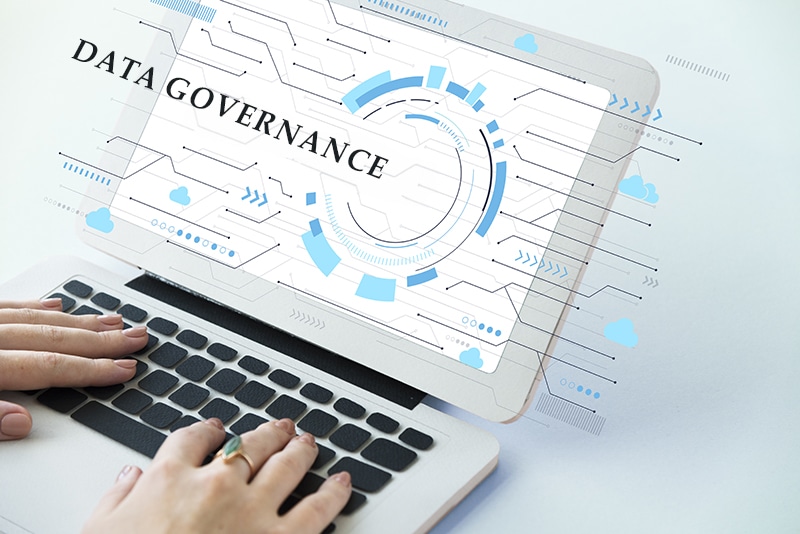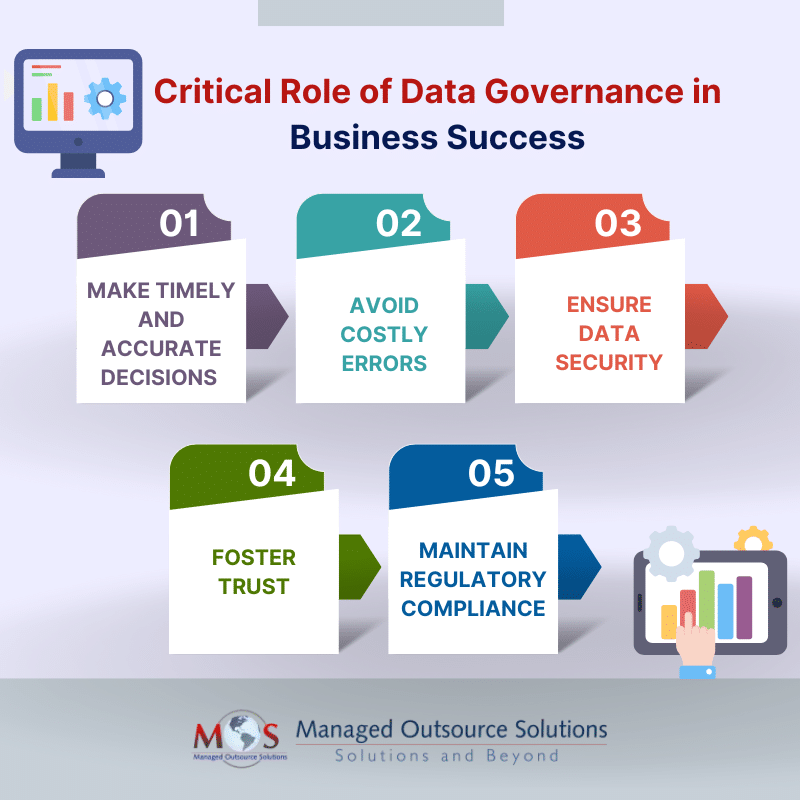Business data includes statistical information, raw analytical data, customer feedback data, and sales numbers, as well as data from human interactions such as emails, digital messages, meetings, contracts, and sensor data. Business process outsourcing solutions for data management cover a range of services, such as data entry, data conversion, data cleansing, and more. Access to high-quality data is critical to an organization’s operations, for defending against digital threats, to recognize failures, and promote success. That’s where data governance comes in.
Tech Target defines data governance as “the process of managing the availability, usability, integrity and security of the data in enterprise systems, based on internal standards and policies that also control data usage”. Effective data governance guarantees that data remains consistent, trustworthy, and safeguarded against misuse. As organizations face growing data privacy regulations and increasingly depend on data analytics to enhance operations and inform business decisions, strong data governance has become more essential than ever.
Why Business Data Governance Matters
Access to secure, timely, relevant, clean, and complete data is essential for gaining insights and applying them to business decisions. Emerging technologies such as machine learning (ML), artificial intelligence (AI), automation and generative AI (gen AI), all depend on high-quality data. Effective data governance is necessary for efficient handling of large amounts of business information and to generate value from it. Poor data governance can cause several problems:
Costly errors: Poor data governance can lead to business decisions based on incorrect assumptions, causing serious damage. In 2017, reports emerged that Uber had been miscalculating its commission, causing New York drivers to lose a percentage of their rightful earnings. The Wall Street Journal estimated the cost of this error would be at least $45 million.
Data breaches: Poor data governance can compromise data security. According to Statista, as of 2024, the average cost of a data breach in the United States amounted to 9.36 million. Bank of America reported a ransomware attack in February 2024, targeting Mccamish Systems, one of the bank’s service providers, affecting more than 55,000 customers. According to Forbes, the breach resulted in unauthorized access to personal details including names, addresses, phone numbers, social security numbers, account numbers and credit card information.
Lack of trust: Questions about data usability and quality can stall business initiatives. Without trust, organizations cannot achieve the collaboration necessary for projects. For instance, it would be impossible to building AI use cases for a company without trust in their underlying datasets. High-quality datasets lead to more accurate and reliable AI models. If the data is flawed—containing errors, biases, or inconsistencies—the AI’s predictions and decisions will likely be flawed as well.
Delayed decisions: Unless you have reliable, organized data, you cannot make proper and timely decisions. For instance, Users may struggle to find the data they need as a result of poor cataloguing, resulting in wasted time and reduced productivity. Inaccurate or inaccessible data can lead decision-makers to rely on flawed insights, resulting in strategic missteps.
Affects regulatory compliance: Inadequate data governance can lead to non-compliance with data protection regulations and industry standards, which impact compliance. For example, insufficient tracking and documentation of data access and usage in a hospital can increase risk of noncompliance with patient data protection regulations like HIPAA.
Effective data governance is critical to avoid these issues and stay ahead in the competitive landscape. Microsoft, Data Bricks, Informatica and Oracle.com are among the top companies with robust data governance models.
Implementing Data Governance
Define your Data Strategy
A clear understanding of business objectives and data needs is essential for developing a data strategy and establishing data governance goals. It’s important to consider both long-term strategic goals and short-term objectives, including the impact of regulations and compliance. A well-defined data strategy will outline data requirements, performance measures and KPIs, key stakeholders, and necessary data management processes, as well as technology priorities and capabilities.
Identify the Key Stakeholders
A data governance program is typically led by a senior executive, supported by a team that manages its operations. The program is governed by a steering committee while a group comprising executives and representatives from various business operations implements and enforces the established policies. Once you identify the stakeholders, you can establish stakeholder roles and responsibilities to achieve your data governance goals.
Ensure Data Usability
Users must be able to easily access and understand data. Each employee must understand how each piece of data is collected, what it means, and how to use it Information must be stored in a centralized database and organized in a simple, logical way. Metadata plays a crucial role in data governance by providing context and structure to data assets.
Data Quality
Having reliable and consistent information is a key aspect of data governance. High-quality data supports accurate and reliable decision making. Conversely, poor quality data can lead to costly, misinformed decisions. Consistently monitoring data is essential to remove incorrect, out-of-date, or corrupted information.
Data Security
Data security is essential to protect data and ensuring that only authorized users have access to specific data. Implementing user permissions will ensure who can view what information. Data security safeguards sensitive data, including personal identifiable information (PII), financial records, and payroll details, from unauthorized access, breaches, and cyberattacks.
Data Auditing
Data auditing is a key part of data governance, which it involves assessing how your organization handles its data. In addition to validating data quality and data access, auditing in necessary to check if the data is compliant with business and regulatory standards. For example, a GDPR data audit can help ensure that personal data is processed lawfully and fairly. Regularly auditing data allows you to make informed decisions and take proactive measures to address any risks.
Implement your Strategy
Once you have established the components of your data governance program, it’s time to take action. This may involve implementing new technologies or processes, as well as making adjustments to existing ones.
Clearly defining your goals and objectives will guide the prioritization and development of your data governance program, ultimately driving revenue, cost savings, and customer satisfaction. Artificial Intelligence (AI) and machine learning can automate processes for identification of new threats and the implementation of technology controls and protections. It is important to stay up to date with evolving international privacy and security regulations in order to fight the threat of increasing liability and risk with statutory penalties and lawsuits. Adopting a privacy by design approach that promotes data security compliance from the start can mitigate risk down the road.
Data governance is easier when you have the right support. Data cleansing companies play a vital role in enhancing business data governance and management by ensuring that data is accurate, consistent, and reliable. They specialize in identifying and correcting errors, removing duplicates, and standardizing data formats, which helps organizations maintain high-quality datasets. By providing tools and expertise for data validation and enrichment, these companies enable businesses to make informed decisions based on trustworthy information. Partnering with an expert can help you establish best practices for data management, driving better compliance with governance policies and enhancing overall data usability within your organization.
Struggling with data quality issues?
Ensure accurate and reliable data with our cleansing services!





